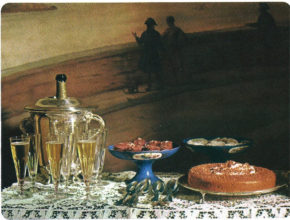“It is bad manners for a gentleman to use perfumes to a noticeable extent.”
Encyclopaedia of Business and Social Forms, 1880
Old etiquette books are apparently very opinionated about a man’s toilette.
When I was teaching etiquette, I taught a number of eleven and twelve year-old boys. I used to say that cologne should be used in a way that it is a gift to only the most special girl. It was a hard sell, at that age they fairly doused themselves in Axe body spray. A few of them would make your eyes water when they entered a room. I hope I saved the nostrils of a few young women with my advice.
Modern etiquette doesn’t say much on the subject. Outside of encouraging young men to shower and not to stink, past the 1950’s American manners manuals tend to stay away from the topic. This probably has something to do with the modern feeling that wearing scents isn’t macho or some such nonsense. The reality is, perfumes and scents were not gendered for thousands of years, with everyone wearing them.
It’s very likely that scent goes back to the Egyptians, archeological digs have found ancient glass bottles with perfume in them. Mostly in the frankincense and myrrh vein, though some florals existed as well such as ancient lily and rose scents. The Persians adopted the use of fragrances, followed by the Greeks and Romans. Each refining the process a little bit as time wore on. The perfumers of Mesopotamia really took scents to a new level and began distilling and refining fragrances into what we would now recognize as perfume. At the same time the Indians were also developing perfumes, so it’s likely there was a lot of advancements all at once, all around the world being fostered by travel and trade.
Perfumes were worn less by European Christians were slow to adopt the wearing of scents, so you don’t really see perfume becoming commonplace until the end of the Middle Ages in the west. But by the Renaissance, scents were being worn both for religious purposes and to cover up bodily odors. Though, contrary to what many people think, people in medieval times bathed regularly and were in fact, quite clean.
The 18th century is a different matter though, with bathing becoming connected with illness because of the plague. “Eau de toilette” are literally perfumes used to clean ones body, became a way to reduce the foul smell of people who tended to only spot clean the body in basins. Indeed, the Louis XIV avoided bathing when he could and smelled so bad, one diplomat to his court said he smelled like a wild beast. The Sun King loved perfume, but I’m not sure if there is enough scent in the world to cover up that funk.
Cologne begins in 1709, when an Italian perfumer living in Germany made a new “toilet water” and named it after his adopted home. “Kolnisch Wasser” was born. The scent he made is still available today if you have a hankering to smell it.
Men basically continued to wear whatever scents that they personally preferred for the next hundred years, with a great deal of leeway to wear highly floral and what we would now consider feminine scents.
There are many reasons why men now exclusively wear Cologne and women wear perfume. Some of it is purely political, as heavily scented perfumes became associated with French Royal courts and decadent “exotic” societies. Some of it is just good old fashioned gender politics: As we entered the 19th century, there became a strong concern with “manly” behavior and appearing dominant and strong. You can see this also in the rise of men wearing beards and mustaches as the Twentieth Century approached. This is part of a greater “de-feminizing” of men in response to the rise of women’s education and rights, gay rights, colonial collapse, fears of religious decline, etc. It’s way too much to address here and better left to historians. But because of this, men stopped wearing “pretty” scents such as floral and light perfumes and woody smells and musks become the order of the day for men. Many of these scents become reminiscent of smoking rooms, gentlemen’s club leather chairs and are named for colonies or have hunting and military overtones. Yikes. I’ll try not to think about that too much.
That brings us to today, where there is more range in what scents men can wear, but there are still some leftover prejudices as to what scents are appropriate for men to wear, if at all. I say, wear it if you like, don’t if you don’t. So long as cologne isn’t a replacement for bathing, you’re good.
Some guides say to stay away from excessively floral scents at work, but even that depends on where you work. If you’re in a buttoned-down corporate job, I’d say to keep the scents to a minimum. That’s not a macho thing, I’d say the same thing to a woman. Some jobs don’t want too much personality in your dress and scent is very personal. You know where you work and what will pass muster.
The only real rule is the same one I taught those boys, keep it minimal. Some people are allergic to scents and while that shouldn’t stop your enjoyment in wearing a cologne, you also don’t want to actively try to make other people sneeze. Some people may also have different taste in scents, so you don’t want to bombard others with your choices.
Snobs fall all over the place when it comes to cologne. I have an old fashioned friend who still wears the same scent his father wore, despite the fact that it smells awful on him. Another friend who’s money goes back generations, thinks that all scents are affectations of the nouveau riche, choosing to smell like “soap and England”. Unfortunately, sometimes England dominates and I wish he’d worn cologne. Another otherwise sartorially divine male friend wears the same Drakkar Noir he wore in high school, dating himself terribly. The thing is, if it makes them happy, who am I to comment? Scent is such a personal thing, it almost is impossible to discuss in terms of pure etiquette. No wonder so many books leave it out altogether.
While your own preference is paramount, if you’re in a relationship, you might want to find out the likes and dislikes of your partner. My husband asks what I think of scents before he buys them. I love the smell of cologne on him, but I’ve a sensitive nose and there are scents that would give me a headache and that happily, isn’t his goal.
Scents fall in a small number of categories, floral, fresh/citrus, fresh/green, woody and exotic/oriental/spice. Couple of points: some people include green with fresh/citrus. Green implies grassy, bright smells. Citrus is well, citrus – lemons, limes, grapefruit, you get the idea. I tend to land in the camp that separates them as I love a green scent in the summer, but I dislike certain citrus smells strongly. Woody is sandalwood, patchouli, cedar, but also the mosses, musk and heavier greens. Exotics are vanilla, pepper and spicy smells. They have long been referred to as Oriental, though many see that term as offensive now, so I avoid it. Exotic is even frowned upon as one man’s exotic is another man’s normal, but I find it more useful a descriptor than spicy since not all exotic smells are spices and may include some heavier floral scents. Anyhow, you can usually tell what type of scent to buy by the categories you prefer. Great thing is once you know someone’s favored categories, you can also buy scents and candles for them that will set the mood, rather than give them a migraine.
Let’s hope we’re all out there soon assaulting each others nostrils with scent. Much love, Cheri


